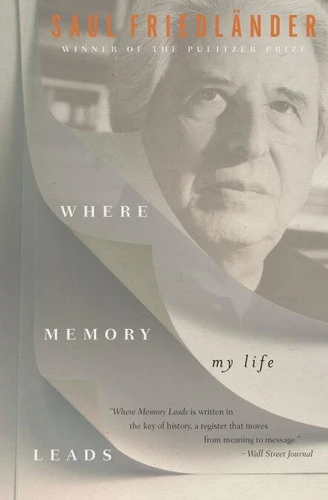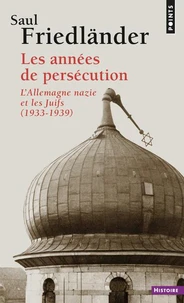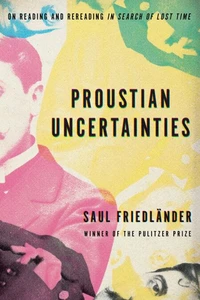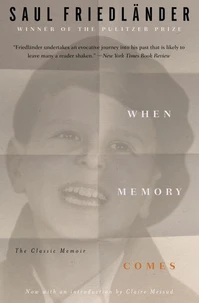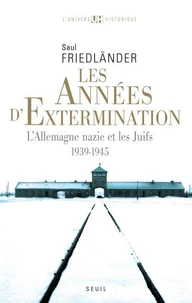Where Memory Leads. My Life
Par :Formats :
Disponible dans votre compte client Decitre ou Furet du Nord dès validation de votre commande. Le format ePub protégé est :
- Compatible avec une lecture sur My Vivlio (smartphone, tablette, ordinateur)
- Compatible avec une lecture sur liseuses Vivlio
- Pour les liseuses autres que Vivlio, vous devez utiliser le logiciel Adobe Digital Edition. Non compatible avec la lecture sur les liseuses Kindle, Remarkable et Sony
- Non compatible avec un achat hors France métropolitaine
 , qui est-ce ?
, qui est-ce ?Notre partenaire de plateforme de lecture numérique où vous retrouverez l'ensemble de vos ebooks gratuitement
Pour en savoir plus sur nos ebooks, consultez notre aide en ligne ici
- Nombre de pages304
- FormatePub
- ISBN978-1-59051-810-6
- EAN9781590518106
- Date de parution08/11/2016
- Protection num.Adobe DRM
- Taille2 Mo
- Infos supplémentairesepub
- ÉditeurOther Press
Résumé
A Pulitzer Prize-winning historian's return to memoir, a tale of intellectual coming-of-age on three continents, published in tandem with his classic work of Holocaust literature, When Memory Comes Forty years after his acclaimed, poignant first memoir, Friedländer returns with WHEN MEMORY COMES: THE LATER YEARS, bridging the gap between the ordeals of his childhood and his present-day towering reputation in the field of Holocaust studies.
After abandoning his youthful conversion to Catholicism, he rediscovers his Jewish roots as a teenager and builds a new life in Israeli politics. Friedländer's initial loyalty to Israel turns into a lifelong fascination with Jewish life and history. He struggles to process the ubiquitous effects of European anti-Semitism while searching for a more measured approach to the Zionism that surrounds him.
Friedländer goes on to spend his adulthood shuttling between Israel, Europe, and the United States, armed with his talent for language and an expansive intellect. His prestige inevitably throws him up against other intellectual heavyweights. In his early years in Israel, he rubs shoulders with the architects of the fledgling state and brilliant minds such as Gershom Scholem and Carlo Ginzburg, among others.
Most importantly, this memoir led Friedländer to reflect on the wrenching events that induced him to devote sixteen years of his life to writing his Pulitzer Prize-winning masterpiece, The Years of Extermination: Nazi Germany and the Jews, 1939-1945.
After abandoning his youthful conversion to Catholicism, he rediscovers his Jewish roots as a teenager and builds a new life in Israeli politics. Friedländer's initial loyalty to Israel turns into a lifelong fascination with Jewish life and history. He struggles to process the ubiquitous effects of European anti-Semitism while searching for a more measured approach to the Zionism that surrounds him.
Friedländer goes on to spend his adulthood shuttling between Israel, Europe, and the United States, armed with his talent for language and an expansive intellect. His prestige inevitably throws him up against other intellectual heavyweights. In his early years in Israel, he rubs shoulders with the architects of the fledgling state and brilliant minds such as Gershom Scholem and Carlo Ginzburg, among others.
Most importantly, this memoir led Friedländer to reflect on the wrenching events that induced him to devote sixteen years of his life to writing his Pulitzer Prize-winning masterpiece, The Years of Extermination: Nazi Germany and the Jews, 1939-1945.
A Pulitzer Prize-winning historian's return to memoir, a tale of intellectual coming-of-age on three continents, published in tandem with his classic work of Holocaust literature, When Memory Comes Forty years after his acclaimed, poignant first memoir, Friedländer returns with WHEN MEMORY COMES: THE LATER YEARS, bridging the gap between the ordeals of his childhood and his present-day towering reputation in the field of Holocaust studies.
After abandoning his youthful conversion to Catholicism, he rediscovers his Jewish roots as a teenager and builds a new life in Israeli politics. Friedländer's initial loyalty to Israel turns into a lifelong fascination with Jewish life and history. He struggles to process the ubiquitous effects of European anti-Semitism while searching for a more measured approach to the Zionism that surrounds him.
Friedländer goes on to spend his adulthood shuttling between Israel, Europe, and the United States, armed with his talent for language and an expansive intellect. His prestige inevitably throws him up against other intellectual heavyweights. In his early years in Israel, he rubs shoulders with the architects of the fledgling state and brilliant minds such as Gershom Scholem and Carlo Ginzburg, among others.
Most importantly, this memoir led Friedländer to reflect on the wrenching events that induced him to devote sixteen years of his life to writing his Pulitzer Prize-winning masterpiece, The Years of Extermination: Nazi Germany and the Jews, 1939-1945.
After abandoning his youthful conversion to Catholicism, he rediscovers his Jewish roots as a teenager and builds a new life in Israeli politics. Friedländer's initial loyalty to Israel turns into a lifelong fascination with Jewish life and history. He struggles to process the ubiquitous effects of European anti-Semitism while searching for a more measured approach to the Zionism that surrounds him.
Friedländer goes on to spend his adulthood shuttling between Israel, Europe, and the United States, armed with his talent for language and an expansive intellect. His prestige inevitably throws him up against other intellectual heavyweights. In his early years in Israel, he rubs shoulders with the architects of the fledgling state and brilliant minds such as Gershom Scholem and Carlo Ginzburg, among others.
Most importantly, this memoir led Friedländer to reflect on the wrenching events that induced him to devote sixteen years of his life to writing his Pulitzer Prize-winning masterpiece, The Years of Extermination: Nazi Germany and the Jews, 1939-1945.

